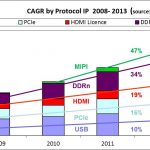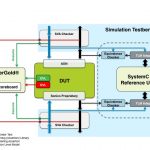… were given to an ever shrinking audience. This is IP-SoC paradox: audience has enjoyed very good presentations made by Cadence, Synopsys or ST-Microelectronic, to name just a few. As far as I am concerned, I was happy to present the “Interface IP Winners and Losers (Protocols)” in the amphitheater during the first day, enjoying… Read More
Semiconductor Intellectual Property
How Sonics Uses Jasper Formal Verification
The Jasper part of Cadence announced jointly with Sonics a relationship whereby Sonics uses JasperGold Apps as part of their verification. I talked to Drew Wingard, the CTO, about how they use it.
One way is during the day when their design engineers use Jasper as part of their verification arsenal. Interestingly it is the design… Read More
What is up with CEVA?!?!?!
Semiconductor IP is definitely driving the rapid mobile expansion we are experiencing today and CEVA is a glaring example of that. Mobile design cycles are a fraction of what they used to be so who has time to create, integrate, AND validate your own IP blocks, especially at multiple foundries?
Just a little background, CEVA is really… Read More
Bluetooth Smart Crashes IoT Party
When you hear the term Internet of Things the first image that comes to mind is, well, a lot of things talking over TCP/IP, maybe using WiFi or god forbid Ethernet. But upon closer examination it seems that Bluetooth is crashing the IoT party. This was driven home for me when my girlfriend gave me a FitBit Flex. For those unfamiliar, … Read More
Semiconductor IP Forecast 2014 – 2020
Given that the majority of my 30+ years in Silicon Valley has revolved around semiconductor IP it should be of no surprise that IP is a big part of SemiWiki and our first book “Fabless: The Transformation of the Semiconductor Industry”. That is also why one of my first round blogger draft choices was IP expert Dr. Eric Esteve. Eric has… Read More
What Presentations to Attend During IP-SoC 2014 ?
Will you go to Grenoble next week to attend to IP-SoC? I will do it and will certainly listen to these Keynote Talks:
- “Platform IP: the next wave for SOCs from IoT to Datacenter” by Tony King-Smith, Executive Vice President, Marketing , Imagination Technologies
- “From Server-class to IoT SoCs: Enabling System
Microprocessors: Will ARM Rule the World?
Last week was the Linley Microprocessor Conference. Not the mobile one, which I find the most interesting since smartphones are such a bit part of what drives process technology these days, this is the one focused on networking and servers. But increasingly both markets are being driven by the same thing, namely mobile data. In … Read More
Who Really Needs USB 3.1?
USB is certainly the most ubiquitous of the Interface protocols. I would bet that everybody is using USB everyday (I mean activate a USB connection, as we also use PCIe or SATA even if we don’t realize that we do it), but which application will get benefit of the 10 Gbps delivered by USB 3.1? Before precisely answering the question, … Read More
G.fast on the copper quick road for broadband
After a four year gestation period typical of global communications standards, G.fast has reached the point where chipset makers can implement parts against stable specifications. Formal approval of the physical layer spec, G.9701, is expected by the end of 2014. G.9700, dealing with power spectral density issues, was approved… Read More
Sensing, Processing and Connecting: IoT Fundamentals
Internet of Things, or Internet of Everything, is certainly the buzzword of the year. Does IoT describe one product family? Not really as the acronym describes a family of concepts, each of these concepts could effectively be turned into a family of products, if this concept reach the market, or fulfill a market need. Nevertheless… Read More






A Century of Miracles: From the FET’s Inception to the Horizons Ahead